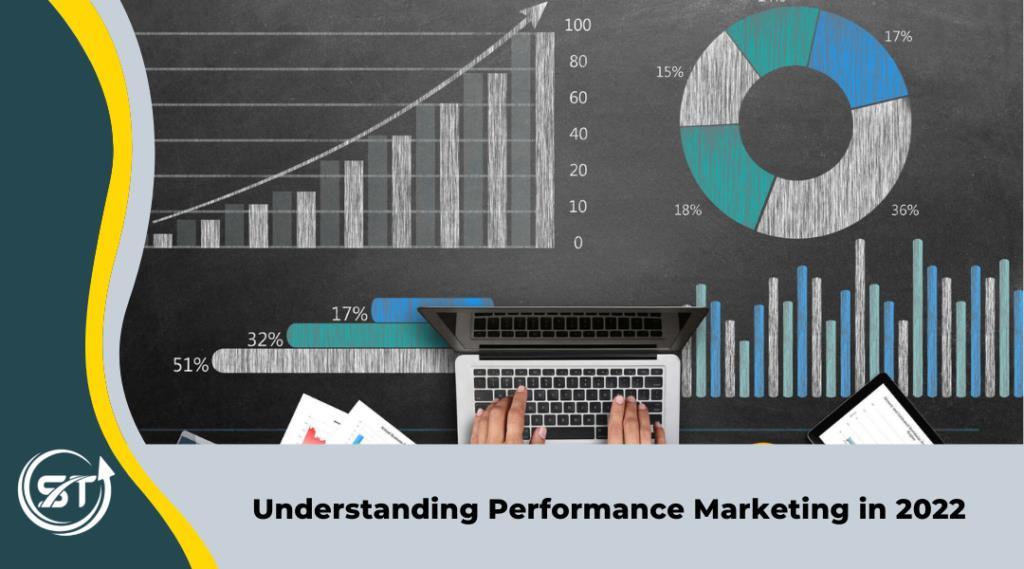Understanding Performance Marketing in 2022
Are you a new brand or business and want to get noticed by a user? Let’s say a user is looking to buy a shoe, goes to Google, sees your competitor’s ad on the top, visits the website, and then makes the purchase. Unfortunately, your revenue is lost! Do you think what if the user could have seen your ads and made the purchase from you instead of the competitor? As a brand, you need to make sure that users see your ads at just the right time so that they can take action on it (like making a purchase). This is called performance marketing and it helps you achieve that goal!

So, what is Performance Marketing?
Performance marketing is a strategic approach to digital marketing that's driven by results. It's a subset of digital marketing where brands pay their performance marketers based on the output, such as sales, Return on Ads Spent (ROAS), more app installs, etc. In simple terms, when a brand pays for its digital marketing consulting services, efforts are rewarded when they reach specific goals or actions are generated.

Modern marketing is different from traditional forms of advertising. Modern marketing is used to drive actions, track and measure those actions, and attribute the return on investment (ROI) of each asset, campaign, or activity.
Performance marketing, which is a combination of paid or organic advertising and brand marketing, can be confusing. However, these two types of marketing are not entirely different. Traditional digital marketing relies on vanity metrics like impressions and likes; performance marketing focuses on revenue and retention not just engagement.
How is it different from Digital Marketing?
Digital marketing gives a brand the chance to reach more people at a lower cost and with less risk, but it doesn’t always provide the kind of control that comes from performance marketing.
Digital marketing is less successful than performance marketing because it takes time to identify the metrics that are most relevant to a brand's success. However, performance marketing is more successful because of its targeted campaigns and metrics.
Can every form of Marketing be Performance Marketing?
It might sound overwhelming that one can multiply the growth of a business by 2X or 5X using Performance Marketing. But can it be used for all forms of marketing?
The answer is both YES and NO.
Marketing campaigns need to be measurable. By measuring their success, you can see whether they are tracking toward your key performance indicators (KPIs). Moreover, performance marketing is a great tool for branding.
Branding is as important for businesses to sustain themselves for the long term as it is for any person to have a positive reputation. A brand is the perception of a product or business by its customers; branding aims to increase awareness of that brand and build long lasting relationships.
Performance marketing and branding are strongly linked. Every performance marketing asset is an opportunity to promote your brand. The more you see your brand, the greater your chances of attracting new customers.
When we write an ad copy for a Google Ads campaign, we describe the offered product or service. Users who type a keyword into the search engine will get a quick impression of what you're selling. The user will then click on the ad that catches their eye, go to your landing page, explore the information about your product or service, and then check out and become a customer. So here, the ad copy promotes your brand by conveying its message in an engaging way and then when someone acts like filling out a lead form or signing up for something, they become part of performance marketing.
What is the Importance of Performance Marketing?
Accountability:
Performance marketing is an accountable way for brands to get results. They only pay for what works, so there’s no guesswork. And because performance marketing is transparent, brands know exactly where the money is going.
Targeting:
Performance marketing allows advertisers to target consumers based on their interests, demographics and past behaviours. This ensures that ads are only seen by those most likely to be interested in them.
Scalability:
A performance marketing campaign can be adjusted to fit the needs of a brand's marketing strategy. It can accommodate both large scale national campaigns and small, niche ones.
What are the Benefits of Performance Marketing?
Easy to track performance:
With data analytics tools, you can easily track and adjust your performance marketing campaigns to improve results.
ROI (Return on Investment) focused:
Performance based marketing is driven by return on investment (ROI), which ensures that campaigns are always moving toward greater results so that brands see an increase in leads and sales.
Versatility:
Performance marketing is a strategy that can be used to reach customers across several different channels. This multiplicity of revenue streams allows marketers to always find new ways to get results.
Diversification of revenue streams:
When one marketing channel isn’t delivering the desired results, try another. That way, you won’t have to continue spending money on ineffective tactics and you’ll only invest in strategies that can bring you revenue.
Reaching new audiences:
Performance marketing is a form of advertising that allows you to attract a wider audience than traditional advertising and tap highly targeted traffic, which can drive more sales. It's particularly effective when it comes to affiliate marketing, because it can help you reach new markets by placing ads on various channels and content outlets.
Pay only for results: Agencies that perform marketing campaigns will only charge you when you see your desired action or goal.
What are the Performance Marketing Channels? Here are the five main channels to consider when creating your campaigns.
Search engine marketing (SEM):
Using organic and paid advertising can help you to increase your visibility and clicks.
Native advertising:
Native advertising is a type of digital ad that looks and feels like the platform on which it appears. You'll find it most often on social media.
Social media marketing (SMM):
Social media marketing is a form of internet marketing that uses social media apps such as Facebook, Twitter, and Instagram to spread awareness about a product or service.
Sponsored content:
Sponsored articles are a form of native advertising that can drive qualified traffic, increase overall online visibility before a highly targeted audience, and convert prospects into customers.
Affiliate marketing:
Affiliate marketing is the promotion of other company’s products on search engines and online sites. Affiliates receive a commission on every sale they generate.
What Key Metrics or KPI does a Performance Marketer focus on?
You need to track your return on investment regularly, so that you can monitor your marketing campaign's success. Here are some of the most common performance marketing metrics and key performance indicators:
CPM (Cost Per Mille or Cost per Thousand):
CPM (cost per mille) is the price an advertiser pays for 1000 impressions of its ad. In other words, it’s the price of getting your ad shown.
CPC (Cost per Click):
The cost per click is the amount paid each time a viewer clicks on an ad. A higher CPC usually means that the value of the conversion is higher because viewers are more engaged with the ad.
Cost per Conversion (or Cost Per Action):
The cost of acquiring a new customer divided by the total number of sales made to that customer. This will allow you to see how much you spend on average for every sale.
Life Time Value (LTV):
LTV stands for lifetime value, which is the amount a company expects a customer to spend throughout their relationship with that company. Predictive analytics can help predict these amounts, which are used to plan overall strategies and boost ROI.
Conclusion:
As a result of the growth in technology and the internet, many new businesses have emerged and are offering creative solutions for brands. These businesses work with a performance driven approach and help increase the reach of companies by increasing brand awareness and revenue. Performance marketing is one primary tool in this sphere that allows businesses to aim for growth through digital channels. Businesses should consider this tool as one solution to having an effective digital presence.
Semtitans is a leading digital marketing company that provides digital solutions to help brands grow their business. It is specialized in Google Ads, FB Ads, SEM, SEO, Website Development Services, Social Media Advertising Services and delivered consistent results so far, serving over 1200+ clients across countries like the US, Canada, and Australia. Get a free consultation now by emailing us at info@semtitans.com
